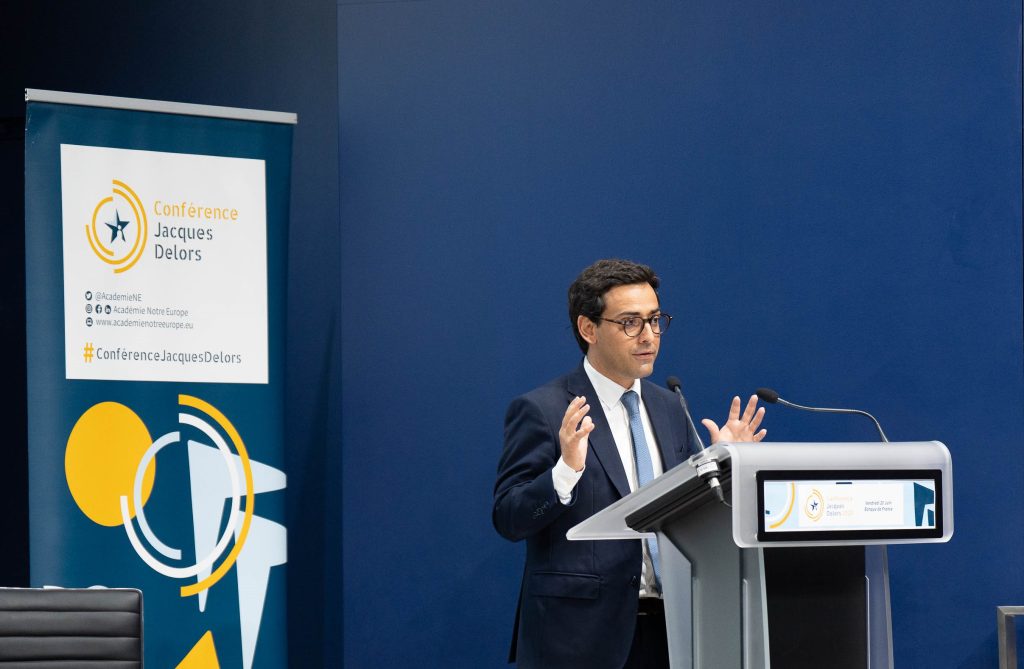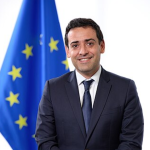[FR] Single Market: a lever for a competitive, inclusive and sustainable economy
Speech delivered at the Jacques Delors 2025 Conference held on 20 June 2025 at the Banque de France

I am honoured and delighted to be here with you today for the Jacques Delors Conference. I am all the more honoured because this year marks the centenary of the birth of Jacques Delors, who will remain a guiding light for all those who, like all of us here, hold Europe dear to their hearts.
I would also like to congratulate you all on your participation in this academy.
Europe needs defenders, especially at this time, and among the younger generations!
Just over three decades ago, under the aegis of President Delors, the single market was born.
It is what makes Europe a reality for 450 million Europeans every day. It is also a huge source of wealth.
It is difficult to quantify precisely, but for goods and services alone, the most reliable economic models estimate at least an 8% increase in GDP at European level.
This shows how much Europe would have to lose without the single market. It also shows, implicitly, how much it still has to gain by deepening it further.
And with good reason: today, in the absence of a simple and integrated market, European companies tend to internationalise before Europeanising.
However, in the current geopolitical and commercial context, this is no longer possible. The opposite must be true: Europeans’ main economic partners must be… Europeans themselves!
The current geopolitical upheaval and the general trend towards economic inward-looking attitudes call for a change of doctrine. We need to do things differently.
For me, this boils down to two main ideas:
- on the one hand, we must liberalise trade between the 27 Member States;
- on the other, we must better protect Europe’s trade borders.
In short, liberalise internally and protect externally.
The first part – increasing trade between us – is the focus of the internal market reform we presented a few weeks ago.
An IMF study shows that barriers to intra-European trade represent the equivalent of 50% of customs duties on goods and 100% on services. These are customs duties that we impose on ourselves!
As Enrico Letta rightly pointed out in his report, we still have a number of absurdities. Things that are not normal.
It is not normal, for example, that nearly two-thirds of existing barriers are at least 20 years old. It is not normal that trade in services between us does not exceed that with our partners outside the EU. It is not normal that in 2025, many of our companies will go international without going through Europe.
The European Union must preserve its added value, retain its talent and inventiveness, and make them bear fruit. That is why, in the reform of the internal market, we have identified the “Terrible Ten”, the ten biggest obstacles to the internal market.
To identify these terrible ten, we followed the Delors method: be practical and listen. Incidentally, the European round table bringing together major economic players active in the European market, which advised Delors when the single market was created, still exists, and I have of course consulted it.
I will give you a few examples of their feedback and the barriers we are tackling.
Take national regulations on professions. Today, in some countries, there is a regulated profession of “mushroom picker”. In others, there is a regulated profession of “domestic carnivore identifier”. While the codification of certain professions may be justified in some cases (to ensure the quality of a service or to promote the specific nature of local expertise), the examples I have just given make no sense and simply block access to certain professions, both for nationals and, of course, for Europeans. The number of these regulated professions must therefore be reduced.
Another example of an obstacle to mobility is that we are unable to agree at European level on a common definition of a physiotherapist! We will speed up, simplify and digitise the recognition of qualifications.
Another example is labelling. Today, in order to explain to consumers how they should recycle certain types of packaging, some countries provide very detailed explanations on the label. In others, there is an alphanumeric code. In yet others, there is a logo, such as the ‘Tri-man’ logo in France. And most of the time, this is because recycling rules differ between countries.
Conclusion: without common rules, we cannot create a European secondary and recycled market.
We are therefore going to work on common rules at European level for the recycling of certain products, such as textiles. And we are going to harmonise labelling. It is simpler, clearer and more effective for consumers. And it is cheaper for businesses.
One last example – you’ve probably heard this story before – a French company wants to set up in another European market but gives up because of the complexity of the procedures involved! First, it has to assess and understand the national company law of each Member State. Then it has to adopt a different national legal form, adapt the organisational structure of each company, pay a lawyer… In short, before even generating any income, it has already lost too much time and money.
For this company and for all the others, we have launched a major simplification drive to make their daily lives easier. We are also working on the digitisation of processes. As for the reform of the internal market, it provides for what has been called a 28th regime. This is a kind of “regime above other regimes”, so that companies only have to go through the procedures once, instead of five, ten or 27 times.
This is essential, particularly to enable our small businesses to grow. Europe must be the place where they scale up before they go international.
These are some of the measures contained in this reform of the single market.
These are the measures proposed by the Commission. It goes without saying that much of the effort also lies with the Member States.
It is also with this in mind that we are asking them to identify at the highest level a sherpa who can embody and champion the cause of the internal market politically.
Ladies and gentlemen, it is up to us to ensure that the single market is not single in name only.
The dramatic period we are going through at global level requires us to push through reforms that have not been implemented – or not sufficiently implemented – in recent decades. We must grasp the urgency of the situation.
Europe has nothing to envy the United States. Nothing to envy China. We have the best talent, the best research, the best infrastructure. Above all, we have the largest developed market in the world – 450 million consumers!
It is high time that we realised our potential and carried out the reforms that will finally transform that potential into results.
In short, let us have the courage to choose Europe!
I know that all of you here at the Notre Europe Academy are convinced of this.
Just as economic policy in the euro area is a matter of common interest and shared responsibility between Member States and European institutions, so too is the single market a matter of common interest and shared responsibility. It is time that it was treated as such.
You are part of the next generation of European citizens who will have to uphold Europe’s values. In a way, you are holding the torch passed on by President Delors. I am therefore counting on you.
So, once again, well done to all of you, and long live the single market!
Thank you.




